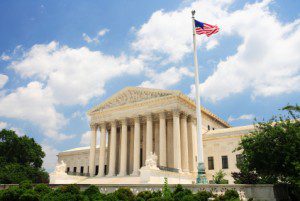By Paul Louis Metzger and Tom Krattenmaker
 Why is it that while talk abounds of growing racial diversity in our country, a new wave of voting restrictions is sweeping over parts of the country and falling hardest on minorities? Perhaps there is more than coincidence at play.
Why is it that while talk abounds of growing racial diversity in our country, a new wave of voting restrictions is sweeping over parts of the country and falling hardest on minorities? Perhaps there is more than coincidence at play.
The Supreme Court’s reframing of the Voting Rights Act to make the individual states responsible for overseeing voting procedures has led many to fear the return of Jim Crow era policies to the country’s polling places. We share this concern. For us, it is not a liberal vs. conservative thing, since one of us is a self-described, secular-leaning progressive (Tom) and the other (Paul) is an Evangelical with more conservative views on many subjects. Nor is it something that only African Americans raise as a concern; we are both white.
No matter our demographic, we have a responsibility to hold accountable the leaders in our democratic system: our elected officials must remain diligent so that Jim Crow policies do not return but simply remain a terrible scar from a deep wound from our democracy’s past. Thus, we firmly believe the federal government must figure out a way to hold the states accountable on voting policies. Discussion ensues as to how Congress might step in so as to protect the rights of minority voters.
We don’t live in a post-racialized society, contrary to what many say. We wonder if those who have made this claim have asked minority groups for their opinion. Let these groups cast votes as to whether or not we live in a post-racialized America.
What is racialization? Racialization (e.g., race’s impact on health care, education, job placement, place of residence, urban development, etc.) does not express itself in fixed, constant terms, but through variables that ebb and flow and evolve. Further to what was stated in a previous post on the subject at this blog,
It is worth noting that according to Michael Emerson and Christian Smith, racialization does not proceed by way of “constants,” but rather “variables.” And yet, many Americans view racialization not in terms of its evolving nature, but in constant, static terms. Thus, Americans tend to limit racialization to a specific timeframe and do not comprehend that racialization is very adaptable and undergoes an evolution over time. Emerson and Smith maintain that there are “grave implications” for failing to recognize that racialization evolves over time…: the more we fail to account for racialization or think that we live in a post-racialized society, the more entrenched racialization becomes (Michael O. Emerson and Christian Smith, Divided by Faith: Evangelical Religion and the Problem of Race in America [New York: Oxford University Press, 2000], p. 8).
We are grieved to see the voter ID laws and the like already being implemented in states including South Carolina, Texas, and Mississippi. Take for example Texas. According to Frontline,
It only took a few hours for TEXAS to move forward on its voter ID law, considered the strictest in the nation. The law requires Texans to prove their citizenship and their residency in the state. To qualify, you’d need to present forms of ID that are expensive and difficult to obtain for some low-income Americans. It requires a passport — the cheapest of which is $55 — or a copy of your birth certificate, which not all Americans, particularly older ones, have.
A court blocked the law in 2012 because it discriminated against Latino and black voters.
This is not simply a Southern phenomenon, however. While the concern historically and in many respects presently focuses on Southern state voting procedures, racialization plays out in subtle but insidious ways in the North in places like our home city, Portland, Oregon, and it can have a huge and negative impact on voting for ethnic minority groups. As African Americans find themselves pushed to our less-well-off suburbs through property tax increases, subtle forms of red-lining in bank loan practices, and aggressive, even manipulative home buyer practices in some cases, they have less and less solidarity to advocate politically for policy changes at the state level of government. Since Portland is the largest city in Oregon, African Americans were able to advocate strongly for their concerns as a voting bloc for decades in the face of policies that would not represent them well. More and more, gentrification fragments their voices and weakens their ability to effect change. We must figure out ways as community leaders, politicians, bankers, real estate and business owners to reverse this trend. So, too, with the Voting Rights Act.
In a democratic society, all of us are at risk of losing our rights if any one segment loses its rights; after all, ours is a government of all the people by all the people for all the people—with justice (or injustice) for all. We need to guard against voting restrictions promoted as color blind, but that many of us know come down hardest on minorities. So, too, if we are going to say at any point that we live in a post-racialized America, we need to make certain that all people have a voice and a role in the political process—minority populations included. After all, that is the democratic thing to do.
This piece is cross-posted at The Institute for the Theology of Culture: New Wine, New Wineskins and at The Christian Post.












